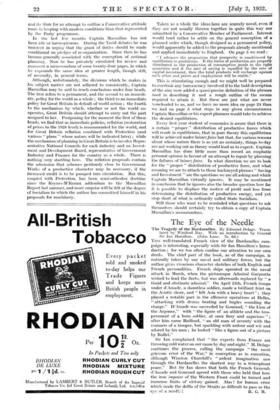The Eye of the Needle
Tilts well-translated French view of the Dardanelles cam- paign is interesting, especially with Sir Ian Hamilton's Intro- duction ; for we too often confine our attention to our own deeds. The chief part of the book, as of the campaign, is naturally taken by our naval and military forces, but the author gives vivacious character sketches of both English and French personalities. French ships operated in the naval attack in March, when the picturesque Admiral Guepratte wished to lead the fleets, but was afterwards replaced by "a timid and obstinate admiral." On April 25th, French troops under d'Amade, a dauntless soldier, made a brilliant feint on the Asiatic shore, and "left Asia with a heavy heart" ; they played a notable part in the offensive operations at Helles,
attacking with drums beating and bugles sounding the charge." D'Amade was succeeded by Gouraud, "the Lion of the Argonne," with the figure of an athlete and the tem- perament of a born soldier, at once fiery and sagacious " ; after him came Bailloud, an old man of seventy with the manners of a trooper, but sparkling with ardour and wit and adored by his men ; he looked "like a figure out of a picture by Raffet."
- Sir Ian complained that "the experts from France are throwing cold water on our cause by day and night." M. Deluge continues the process, calling the campaign "the most grievous error of the War," in conception as in execution, although Winston Churchill's "ardent imagination saw through the Dardanelles the shortest way to a triumphant peace." But Sir Ian shows that both the French General.] d'Amade and Gouraud agreed with those who held that here the iron impasse of the Western Front could be turned and immense fruits of victory gained. Alas ! for human error which made the defile of the Straits as difficult to pass as the






































 Previous page
Previous page